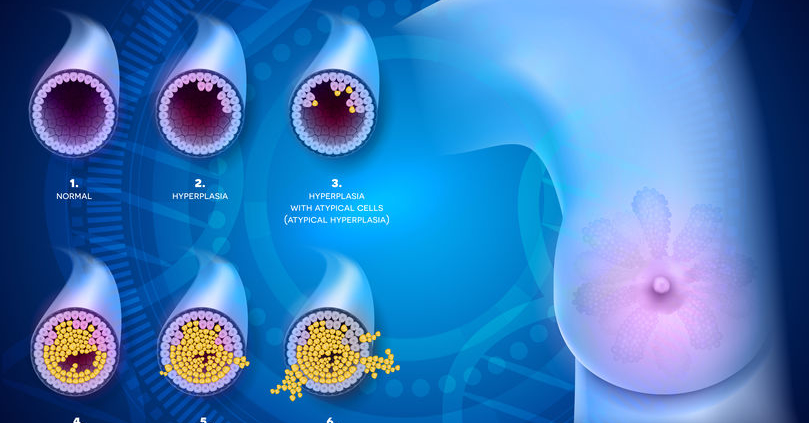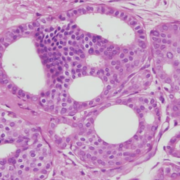24 August 2015
A study published in JAMA Oncology raises more questions regarding appropriate treatments for ductal carcinoma in-situ (DCIS). I wrote about surgery for DCIS about a month ago. The controversy continues.
The JAMA Oncology study by Dr. Steven Narod and colleagues used the SEER Database to try to determine if treatment for DCIS improves the death rate. They found that breast cancer-specific mortality was approximately 3.3% over a 20 year period, a very low rate. Certain patient populations such as women under the age of 40, African Americans, and patients with ER-negative and more aggressive subtypes of DCIS had higher mortality rates.
This study has led to headlines including Doubt is Raised over the Value of Surgery for Breast Lesion at Earliest Stage (New York Times, New Breast Cancer Study Raises Questions, Delivers Few Answers (NBC News), Study Sparks Debate on Treatment for Early Stage Breast Cancer (USA Today) and Early Stage Breast Cancer Not a Death Sentence (WebMD). Evaluation of the news coverage by Health News Review provided some context. Linked below are the comments of several experts.
The scope of the problem is huge. DCIS represents approximately 20-25% of all breast cancers, and about 60,000 women in the US will be diagnosed every year. It is most commonly diagnosed by mammography, as it usually does not form a lump. DCIS is known as “Stage 0” breast cancer – under the microscope, the cells look the same as invasive cancer cells, but they are contained within the milk ducts. DCIS has been considered a non-obligate precursor to invasive cancer (may turn into but doesn’t always). A less common point of view considers DCIS to be a “high risk” lesion indicating an increased risk of developing breast cancer in the future. Since we don’t have a good way to determine which lesions simply indicate high risk and which ones will progress, we generally recommend surgery, radiation therapy, and hormonal therapy (such as tamoxifen or aromatase inhibitors, if the DCIS is hormone-receptor positive) with the goal of reducing the risk of invasive cancer and death. The Narod study is notable in that the researchers found that regardless of whether or not women received radiation therapy, survival rates did not change. If DCIS is a direct precursor to invasive cancer, treatment that reduces recurrence rates should result in improved survival.
What is very clear is that DCIS is not one disease, and we haven’t yet gotten to the point of being able to pin this down for the individual woman. Some forms of DCIS may indeed simply be markers of increased risk. Lifestyle changes, hormonal, or immunological therapies could potentially be used to reduce the risk of invasive cancer in these cases, a point raised by Drs. Laura Esserman and Catherine Yau in their JAMA Oncology editorial: Rethinking the Standard for Ductal Carcinoma In Situ Treatment. Some women may ask, “what is the harm in treatment?” or “isn’t it better to be sure?”. But surgery, radiation therapy and hormonal therapy are associated with long term side effects such as pain, breast fibrosis and scarring, lymphedema, osteoporosis and more.
There are some limitations of the study. It was a database review, not a prospective randomized trial, which is considered the “gold standard” for research. While the researchers report on 20-year mortality rates, these are projected, not actual rates – women were followed for variable amounts of time, depending on when they were diagnosed and entered into the database. Other factors such as family history and presence or absence of a genetic mutation were not evaluated.
Research is clearly needed in multiple areas including the biologic behavior of the various subtypes of DCIS as well as racial, ethnic and age-related differences related to tumor behavior. In the meantime, women newly diagnosed should keep in mind that we do not have all the answers. A careful case-by-case evaluation is necessary to help come up with the most appropriate treatment plan, based on our current knowledge and an individual woman’s preferences. A diagnosis of DCIS is not an emergency. Take your time to become informed before making your decisions.
To be continued…
Expert Opinions:
How Should we Treat Stage 0 Breast Cancer Dr. David Gorsky
Why Women and Doctors Need to Know More About DCIS Dr. Elaine Schattner
Treatment for Early Breast Cancer will Benefit Some Dr. Otis Brawley
Are All Appearances What They Seem? New Insights into DCIS Dr. Susan Love
What the Headlines Got Wrong About The New DCIS Study Oncology Times
How Do We Treat Early Stage Breast Cancer The Diane Rehm Show (NPR) with Drs. Barnett Kramer, Shawna Willey, Vinay Prasad and Daniel Kopans






